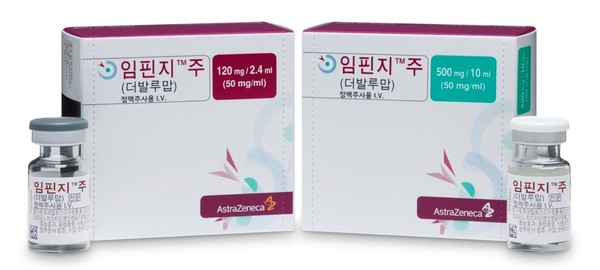AstraZeneca’s anti-PD-L1 immunotherapy Imfinzi (ingredient: durvalumab) in combination with the standard chemotherapy lowered the risk of death by 20 percent in the treatment of biliary tract cancer, the company said.
The results came from a global phase 3 trial, expanded from a phase 2 study led by a Korean researcher.

Professor Oh Do-youn of the Division of Medical Oncology at Seoul National University Hospital will orally present the global phase 3 TOPAZ-1 study results at the American Society of Clinical Oncology Gastrointestinal Cancers Symposium (ASCO GI 2022), set for Jan. 20-22 in San Francisco, California.
The study compared Imfinzi plus chemotherapy with chemotherapy alone in the first-line treatment of advanced biliary tract cancer.
Dr. Cathy Eng, a member of the ASCO GI committee, released the outcome of TOPAZ-1 on Tuesday, saying the current standard of care for inoperable biliary tract cancer was combined chemotherapy.

“That standard has not changed in over a decade. TOPAZ-1 is the first phase 3 trial to demonstrate the benefit of immunotherapy for improved overall survival, in combination with chemotherapy, creating a new standard of care,” she said. “Patients have a greater reason for hope given the positive results seen with the use of immunotherapy in biliary tract cancers.”
The TOPAZ-1 study was a multinational, randomized, double-blind, placebo-controlled phase 3 trial that tested Imfinzi plus gemcitabine and cisplatin compared with placebo plus gemcitabine and cisplatin in 685 patients with advanced biliary tract cancer.
Professor Oh is the principal investigator of TOPAZ-1.
Based on the positive results of the investigator-initiated phase 2 clinical trial in Korea, she successfully conducted the global phase 3 study. She made a new treatment paradigm in inoperable biliary tract cancer.
The local phase 2 study results were announced at the annual meeting of ASCO in 2020. The study evaluated the effect of Imfinzi plus tremelimumab added to the conventional gemcitabine plus cisplatin in the first-line treatment of advanced biliary tract cancer.
In the study, Oh found that adding immunotherapy to existing chemotherapy showed promising potential in efficacy and tolerability.
Then, AstraZeneca picked Oh as the principal investigator of the global phase 3 trial to evaluate Imfinzi plus chemotherapy. The results were released at ASCO GI 2022 for the first time.
TOPAZ-1 recruited patients in the U.S. and 17 countries in Europe, Asia, and South America. About 55 percent of the patients were from Asia, including Korea, Thailand, Japan, and China.
Patients had one of the three types of biliary tract cancer – 55 percent with intrahepatic cancers occurring in bile ducts inside the liver, 19 percent with extrahepatic cancers which form outside the liver, and 25 percent with gallbladder cancer.
The study results showed that patients who received the Imfinzi combo had a 20 percent lower death risk than the placebo combo group. At 18 months, the survival rate was 35.1 percent in the Imfinzi group versus 25.6 percent in the placebo group. At 24 months, the rate was 24.9 percent and 10.4 percent, respectively.
The Imfinzi group also significantly improved progression-free survival (PFS). The group had a 25 percent lower risk of disease progression and death than the placebo group.
The most common adverse events were anemia (48.2 percent), neutropenia (31.7 percent), and nausea (40.2 percent). Potentially serious side effects occurred 62.7 percent in those treated with Imfinzi and 64.9 percent in placebo, indicating that most adverse reactions were caused by chemotherapy.
“TOPAZ-1 proved that adding immunotherapy to the standard chemotherapy improved survival in biliary tract cancer,” Oh said. “More importantly, it is the first phase 3 study to show survival improvement without causing new serious adverse events.”
She hoped that durvalumab plus gemcitabine/cisplatin could become a new standard treatment for advanced biliary tract cancer.

